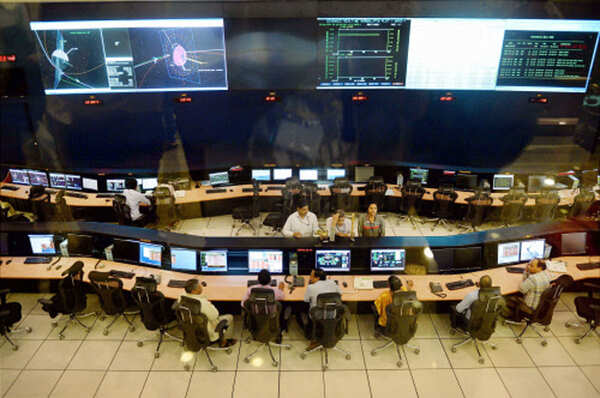- News
- India News
- World watches Mars Orbiter Mission’s quest for methane
Trending
This story is from September 20, 2014
World watches Mars Orbiter Mission’s quest for methane
Is it time to plan human colonies on Mars like former Isro chairman U R Rao had once said? The idea seems far-fetched with the Red Planet still largely unexplored, notwithstanding several probes by many countries.

BANGALORE: Is it time to plan human colonies on Mars like former Isro chairman U R Rao had once said? The idea seems far-fetched with the Red Planet still largely unexplored, notwithstanding several probes by many countries.
Scientists worldwide are considering the idea, and that’s why they’re keenly watching two Mars-bound spacecraft: India’s Mars Orbiter Mission (MOM) and the US’ Mars Atmosphere and Volatile EvolutioN (MAVEN) mission.
MAVEN will reach the Martian orbit on September 21, while MOM will be inserted into the orbit three days later. MAVEN’s primary objective will be to explore Mars’ upper atmosphere, ionosphere and interactions with the sun and solar wind.
The Indian mission will be watched more closely, given that it’s looking for methane, which could be proof of life. Nasa’s ‘Curiosity’ was unable to detect methane. A S Kiran Kumar, associate director, Isro Space Application Centre, which developed the Methane Sensor for Mars (MSM) had told TOI that once inserted into the designated orbit, MSM would pick up the methane absorption wavelength and measure the magnitude of methane up to the surface of the planet. “This method is different from that employed by Curiosity,” he had said.

Nasa, which is planning a manned mission to Mars in the future, says: “The formation and evolution of Mars are comparable to Earth, helping us learn more about our own planet’s history and future. Mars had conditions suitable for life in its past. Future exploration could uncover evidence of life, answering one of the fundamental mysteries of the cosmos: Does life exist beyond Earth?”

Scientists working on Mars Orbiter Mission in the Mission Analysis and Mission Control room in Bangalore on Wednesday. (PTI Photo)
Being India’s first Mars shot, there have been several challenges and Isro seems to have overcome most of them so far. There has also been some criticism of whether a poor country like India should fund such a project. But the mission has been a dream, as Isro chairman K Radhakrishnan had put it during the launch last November. And, dreams are not bound by costs or other factors.
Scientists worldwide are considering the idea, and that’s why they’re keenly watching two Mars-bound spacecraft: India’s Mars Orbiter Mission (MOM) and the US’ Mars Atmosphere and Volatile EvolutioN (MAVEN) mission.
MAVEN will reach the Martian orbit on September 21, while MOM will be inserted into the orbit three days later. MAVEN’s primary objective will be to explore Mars’ upper atmosphere, ionosphere and interactions with the sun and solar wind.
The Indian mission will be watched more closely, given that it’s looking for methane, which could be proof of life. Nasa’s ‘Curiosity’ was unable to detect methane. A S Kiran Kumar, associate director, Isro Space Application Centre, which developed the Methane Sensor for Mars (MSM) had told TOI that once inserted into the designated orbit, MSM would pick up the methane absorption wavelength and measure the magnitude of methane up to the surface of the planet. “This method is different from that employed by Curiosity,” he had said.
The International Space Exploration Co-ordination Group (ISECG), of which India is a member, is also keenly watching the event. While India would have won the battle once MOM enters the Martian orbit, the larger challenge would be to find methane.

Nasa, which is planning a manned mission to Mars in the future, says: “The formation and evolution of Mars are comparable to Earth, helping us learn more about our own planet’s history and future. Mars had conditions suitable for life in its past. Future exploration could uncover evidence of life, answering one of the fundamental mysteries of the cosmos: Does life exist beyond Earth?”

Scientists working on Mars Orbiter Mission in the Mission Analysis and Mission Control room in Bangalore on Wednesday. (PTI Photo)
Being India’s first Mars shot, there have been several challenges and Isro seems to have overcome most of them so far. There has also been some criticism of whether a poor country like India should fund such a project. But the mission has been a dream, as Isro chairman K Radhakrishnan had put it during the launch last November. And, dreams are not bound by costs or other factors.
End of Article
FOLLOW US ON SOCIAL MEDIA










